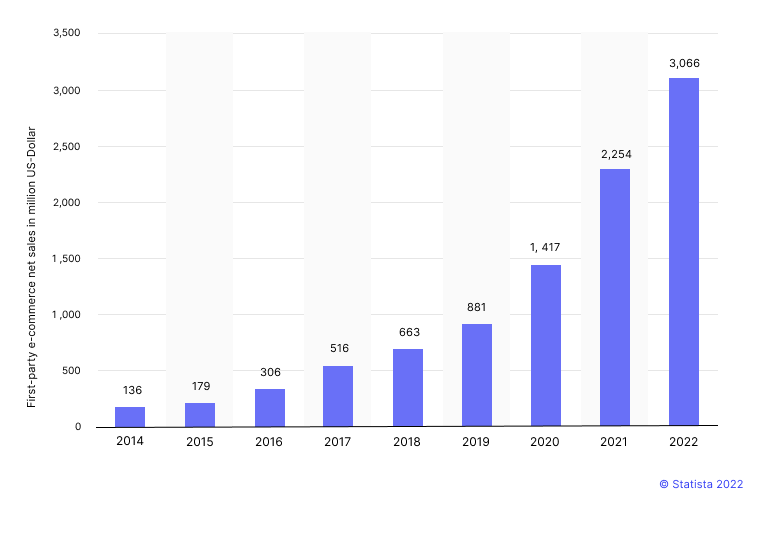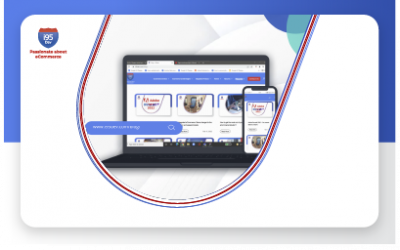Integrated eCommerce helps Sports Brands
Achieve eCommerce Success

As we inch towards 2023, eCommerce has become a mainstream phenomenon in all our lives, and the sports sector is emerging as one of the biggest adopters as people have become more conscious of their health.
However, unlike other apparel and products, it is difficult to reflect the value in the sports goods industry, which continues to struggle with eCommerce adoption.
Also, the lead times, go-to-market time, and fulfillment need to be at par with the regular clothing, making it difficult for new entrants since the shelf life is generally longer in their case.
To help readers from the sports industry decide on integrated eCommerce solution adoption, experts at i95Dev have curated this article to discuss four success stories of sports brands’ eCommerce journeys.“
Let’s begin:
K2 Sports

K2 Sports is a US-based premier winter wear brand focused on creating unforgettable experiences.
Its product portfolio comprises Skiing equipment, snowboards, snowshoes, and safety equipment, while its competitors consider its marketing strategy ingenious.
As a pioneer in winter wear innovation, K2 Sports realized it was being held back by its eCommerce platform, Sales Commerce Cloud.
The leaders at K2 Sports felt that they couldn’t deliver a cutting-edge customer experience as the Sales Commerce Cloud platform wasn’t cloud-based and had little support for APIs.
On top of that, the maintenance and development costs also limited K2 Sports’ ability to scale their business, especially regarding the international market.
Thus, it decided to go for a feature-rich eCommerce platform that extended a marketer-friendly setup at affordable prices.
After extensive research, K2 Sports decided to go for Big Commerce as it allowed API-first headless configuration, while they selected Content stack as their frontend’s CMS.
The integrated eCommerce setup helped K2 Sports expand its network to 16 sites and launch eight brands within nine months.
While the integrated eCommerce solution helped K2 optimize its content marketing strategy, it also achieved a 75% higher web development speed and a 90% hike in publishing rate, throttling up its productivity by a staggering 50%.
Wish to know the multiple benefits of a modern integrated eCommerce solution?
Adidas
 If you know a sneakerhead, you will know that sneakers and other sportswear manufacturers operate under high-voltage conditions. Everything must happen lightning fast, from their products’ design and go-to-market time to their deliveries, putting enormous pressure on their eCommerce infrastructure. As you can see in the below graph, it has witnessed tremendous progress when it comes to eCommerce sales:
If you know a sneakerhead, you will know that sneakers and other sportswear manufacturers operate under high-voltage conditions. Everything must happen lightning fast, from their products’ design and go-to-market time to their deliveries, putting enormous pressure on their eCommerce infrastructure. As you can see in the below graph, it has witnessed tremendous progress when it comes to eCommerce sales:  Adidas needed a cloud-native solution that offered excellent scalability, agility, reliability, and efficiency to keep up with its impromptu hype sales and overall business model. These qualities were prerequisites to its intentions to accelerate innovation cycles and level up its user experience. Before 2019, it invested in transitioning to a cloud-based eCommerce system with Kubernetes-based microservices at its connected ecosystem’s heart. Adidas was apprehensive of vendor lock-in and opted for open-source solutions. In its quest to implement an operable, observable, and flexible solution, it implemented its Finland-spec solution to five global locations with massive (CI/CD) pipelines of over 100,000 builds per month. The eCommerce solution helped it stay afloat despite the pandemic and constantly grow while creating a 750 terabytes data lake and shifting 200 developers overnight on its new platform amid the pandemic.
Adidas needed a cloud-native solution that offered excellent scalability, agility, reliability, and efficiency to keep up with its impromptu hype sales and overall business model. These qualities were prerequisites to its intentions to accelerate innovation cycles and level up its user experience. Before 2019, it invested in transitioning to a cloud-based eCommerce system with Kubernetes-based microservices at its connected ecosystem’s heart. Adidas was apprehensive of vendor lock-in and opted for open-source solutions. In its quest to implement an operable, observable, and flexible solution, it implemented its Finland-spec solution to five global locations with massive (CI/CD) pipelines of over 100,000 builds per month. The eCommerce solution helped it stay afloat despite the pandemic and constantly grow while creating a 750 terabytes data lake and shifting 200 developers overnight on its new platform amid the pandemic.
Arc’teryx
 Arc’teryx defines itself as a “high-performance outdoor equipment company” that aims to cater to enthusiasts into trailblazing and new adventures. Arc’teryx realized that it was missing a mobile app that was contradictory to its brand image and compromised its digital presence. Though it had an existing mobile app, it wasn’t competent enough to serve its audience, and thus, it decided to integrate its eCommerce platform with a brand new mobile app. Arc’teryx hired a vendor to upgrade its eCommerce solution and integrate it with a brand new mobile app and achieved the following results:
Arc’teryx defines itself as a “high-performance outdoor equipment company” that aims to cater to enthusiasts into trailblazing and new adventures. Arc’teryx realized that it was missing a mobile app that was contradictory to its brand image and compromised its digital presence. Though it had an existing mobile app, it wasn’t competent enough to serve its audience, and thus, it decided to integrate its eCommerce platform with a brand new mobile app. Arc’teryx hired a vendor to upgrade its eCommerce solution and integrate it with a brand new mobile app and achieved the following results:
- 16% reduction in Crash rates
- 39% increase in app-based sales conversion
- 29% increase in app-based orders
- 8% increase in repeat visitors
- 8% increase in daily active users
- 57% reduction app uninstalls
Overall, Arc’teryx benefited from the transition, and it was also able to make more informed promotion and inventory decisions as it turned into a mobile-first e-commerce leader.
Sportbike Track Gear

Sportbike Track Gear is much more than a motorsport brand- it manifests the adventure lifestyle on two wheels.
It was a thriving success as it enjoyed tremendous popularity. Still, to its surprise, its eCommerce platform ProStores went out of operation, and Sportbike Track Gear needed to find a new solution quickly.
After going through multiple platforms, including Magento, Sportbike Track Gear finally went with BigCommerce to manage its sales.
With the help of an integrated eCommerce connector, it could automate its day-to-day operations, manage accounts, sort merchandise, and run sales campaigns more accurately.
It witnessed a bumper 16% increase in traffic, reduced bounce rates, and a massive 21% jump in conversion; the company finds itself in quite a competitive position as it saved more than $100,000 in development and hosting costs.
Wrap Up
More prominent brands like Adidas and Nike in the sports equipment industry embrace eCommerce solutions, while smaller firms depend on marketplaces like Amazon.
However, an integrated eCommerce solution can help you leverage multiple platforms and selling channels, including social commerce, without worrying about manually managing the operations.
Feel free to get in touch with i95Dev for the best advice on implementing integrated eCommerce solutions for your sports equipment company.
Recent Blogs
Enhancing Shipping Precision with Custom Shipping Groups in Adobe Commerce/ Magento
Enhancing Shipping Precision with Custom Shipping Groups in Adobe Commerce/ Magento Author Category Share Three things matter the most when it comes to eCommerce shipping: speed, accuracy,...
Managing Massive Product Catalogs: Why Synchronization is the Key to Efficiency
Managing Massive Product Catalogs: Why Synchronization is the Key to Efficiency Author Category Share The automotive aftermarket industry is vast and highly competitive, requiring businesses...
A Complete Guide to Seamlessly Integrating Adobe Commerce with NetSuite
A Complete Guide to Seamlessly Integrating Adobe Commerce with NetSuite Author Category Share Integrating Adobe Commerce (formerly Magento) with NetSuite ERP can transform the way businesses...



